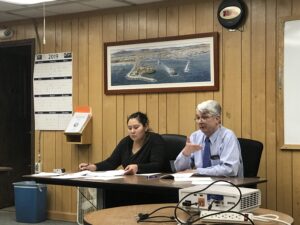As many social distancing and shelter-in-place regulations are still in effect, Western Alaskans can feel like they are isolated, with few ways to take care of their mental well-being. But local mental healthcare providers are utilizing their distance healthcare capabilities to provide residents of the Bering Strait region the services they need.
But as KNOM’s Emily Hofstaedter reports, the coronavirus pandemic is also showing the limits of that infrastructure.
Garrick Fuller is a Nome-based behavioral health clinician. He works for Behavioral Health Services (BHS) under the Norton Sound Health Corporation (NSHC). Most of Fuller’s clients are children and he says he normally works best when the children can just play.
“I have a number of toys in my office that a child that comes in and meets with me can play with, in any way that they want to. I’m there to sit with them, be a part of their play, if they want me to. But [I’m there] to look for themes, interpret their play, and use our interaction as a therapeutic technique in and of itself.”
But now Fuller can’t see his clients face to face. Behavioral Health Services has had to go to distance counseling as a result of the coronavirus pandemic. All BHS clients have had to switch to either telephonic or online counseling.
It’s nearly impossible to work with children over the phone, explains Fuller, so he has to meet with them via Zoom or Skype; if his clients even have access to the internet.
“I’m encouraging them to play with whatever toys they have in their own room while still kind of angling the phone or computer to where I can see them and the toys. And I’m trying to figure out how can I still play with them from my end too because we’re not in the same room, so how do we still have this playful interaction when there’s a screen between us?”
Fuller estimates that he’s been able to work with about half of the clients he had pre-pandemic.

Working with children at a distance is a newer challenge for Fuller, but distance or telemedicine isn’t actually new for BHS services overall.
As a health provider in rural Alaska, BHS has already been making use of alternatives to the typical face to face meeting. There are counselors based in every village and before the pandemic, clinicians traveled to communities for face to face meetings.
BHS Director Lance Johnson explains that many clients outside of Nome were in the habit of going to their local healthcare clinic and doing a video conference with a clinician who was working elsewhere.
“Now, we’re doing it right to somebody’s house. They might be in their bedroom chilling out on their bed and we’re doing a service.”
The COVID-19 pandemic has allowed some privacy laws to be relaxed, which means BHS clients can now talk to a provider from their own cellphone and in the comfort of their own home. That’s a huge benefit, again, in a region where many have internet data caps that have to support the needs of whole households.
And while Johnson firmly believes face to face counseling is the best option, he acknowledges that distance mental healthcare has been beneficial for some.
“Sometimes people can get shy or it’s harder to be vulnerable sometimes when it’s face to face with someone, and I think the phone and the video tele-conferencing offers a little bit of security around that.”
While some may feel secure in their homes, it is simultaneously a disadvantage for others.
Clinicians like Garrick Fuller understand that it isn’t easy for all of their clients to have privacy in their own homes, like they do in an office or clinic setting. Some people live in overcrowded housing where the entire household is sheltering in place.
“They can tell me they’re in a secure private place, but I don’t actually know where they are. Phone and video are not 100% secure, so as much as we do our best for privacy, and take every step we can to maintain…you can’t assure 100%.”
And while it is rare, technology can be hacked and compromise patients’ privacy.
There are some providers in Nome, like Ivory Okleasik, who are finding their practices harder to adapt for social distancing. She works through Native Connections at BHS and ran group talking circles at places like the high school, the women’s shelter and Day Shelter before the coronavirus pandemic. But the logistics of a socially distant talking circle became overwhelming.
“It’s hard to have a talking circle having people stand six-feet apart… And then its such a big space that we wouldn’t be able to hear that well and a lot of different distractions could happen.”
It’s not an environment conducive to facilitating intimacy and connection. And for many people in those situations, technology and privacy aren’t accessible for conferencing. Okleasik is still exploring her options, where it is possible.
“We’re planning on doing a Zoom talking circle with Kawerak Wellness, hopefully that will start off in a couple of weeks.”
And that plan would develop a framework that could potentially be used post-pandemic.
Telehealth might be the best solution for mental healthcare in the Bering Strait region right now. And while hospitals are slowly opening to provide non-emergency medical services, BHS Director Lance Johnson says it will be a bit longer before they resume regular in-person behavioral health services.
Johnson says they have had people discontinue their mental health treatment while the pandemic is restricting movement and medical services. But they’ve also had new patients register. That data comes anecdotally, Johnson doesn’t have firm numbers for BHS patients who have become inactive during the pandemic. And he says they are prepared to be able to help someone if that person has an emergency that can’t be addressed over the phone.
If you are interested in receiving mental health services, you can reach Behavioral Health Services during business hours to 907-443-3344 or call the Acute Care Line which is open 24 hours a day (907)443-3200.
Image at top: East beach in Nome during the summer of 2015, KNOM (2015).





